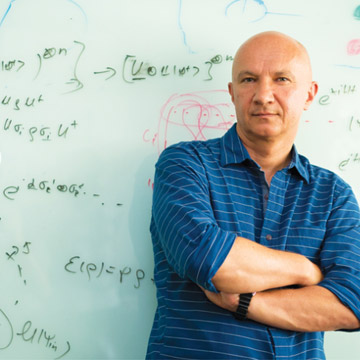Letter from the director
So, how is the Centre doing? I keep hearing this question over and over again; it resonates in my head like a well rehearsed mantra. It invariably comes within the first ten minutes into any official, or even casual, lunch or dinner. It is asked by friends and colleagues, by people from academia, government agencies, industry and even by my diving buddies. And you know what — I do not mind being asked. I mean it. This is because I do not have to repeat the same story over and over again, so I am never bored. I believe the Centre is doing well simply because there is always something new, something exciting to talk about. It is only the second year of our existence and yet there are many highlights to choose from.
So I can tell people how we took our quantum cryptographic kit to Las Vegas to expose it to the hardcore hackers at one of their annual gatherings. How our home-made Bose-Einstein condensation elevated the Centre to the status of the coolest place on the Equator (give or take one degree of latitude) and how quantum phenomena can help birds in their navigation skills (no, I am not kidding). Sometimes the topic may be very elusive and esoteric, say a conjecture that was defeating the community for ten years and was finally resolved by one of our researchers, or perhaps elucidation of intricate connections between information causality and some wacky correlations. Still, even then, there is always a thrill of discovering something new, and that is easy to convey.
And one should never forget to mention that behind all these interesting results there are fantastic people — our researchers, students, technical and administrative support — who in their own way contribute to our unique research environment and make good science happen.

Artur Ekert was CQT's founding Director, leading the Centre from December 2007 to July 2020. He is also the Lee Kong Chian Centennial Professor at the National University of Singapore and the Professor of Quantum Physics at the Mathematical Institute, University of Oxford, UK. He is one of the pioneers of quantum cryptography. He has worked, communicated with and advised several companies and government agencies.
His current research extends over most aspects of information processing in quantum-mechanical systems. He is a recipient of several awards, including the 1995 Maxwell Medal and Prize by the Institute of Physics and the 2007 Royal Society Hughes Medal. In his non-academic life he is an avid scuba diver.






